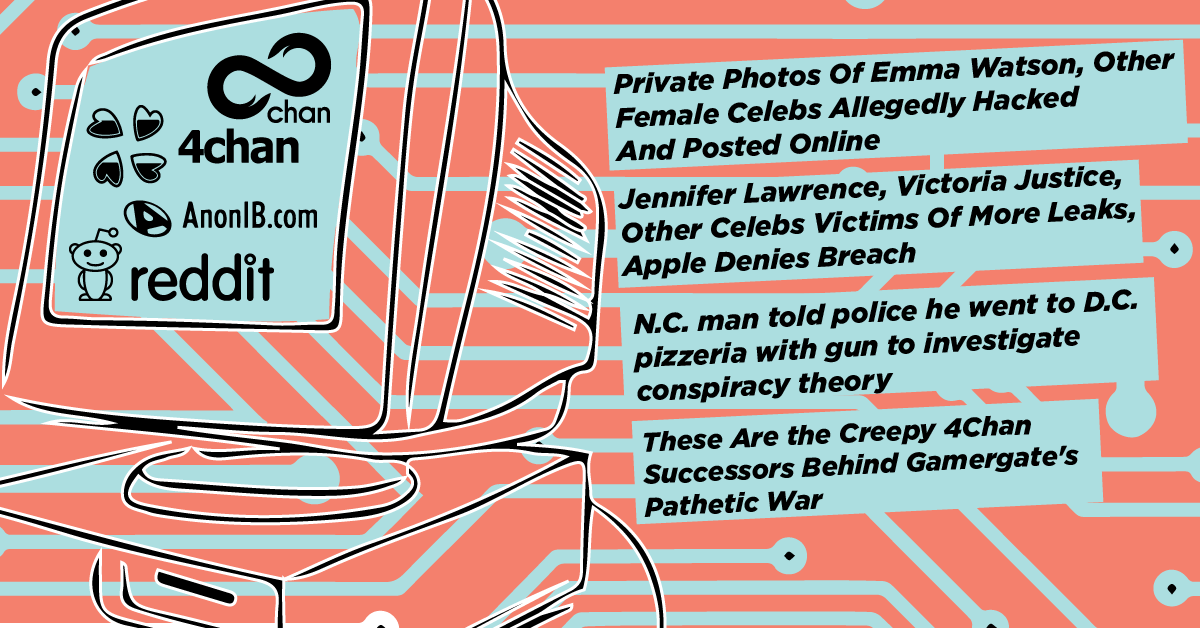
Online message boards that allow anonymous posting -- including 4chan, 8chan, Reddit, and AnonIB -- tend to make headlines mainly when users illegally share private photos of high-profile women. But such photo sharing is just part of the relentless abuse that these sites constantly allow and enable.
On a daily basis, users of these message boards target women, people of color, activists, members of the media, and vulnerable communities like undocumented immigrants by orchestrating online harassment campaigns, which can involve illegal activities like hacking and publishing personal information and images. The sites are often also the origin of unsubstantiated speculation, which can make its way to fake news purveyors and hyperpartisan blogs that push misinformation, sometimes causing dangerous real-life consequences.
The actor Emma Watson was one of the victims of a recent illegal photo-sharing scandal, in which alleged personal photos were widely circulated on Reddit and 4chan. Weeks before, reports had revealed that members of the armed forces were involved in sharing “nude photographs of women, including fellow Marines -- some taken without their knowledge” through the anonymous posting site AnonIB, which was also implicated in the publication of hacked personal photos of a number of celebrities, including Jennifer Lawrence, in 2014.
The cases involving celebrities and members of prominent military institutions are widely reported, but their treatment is just one part of the picture. These sites enable victimization of other individuals on a daily basis -- often as part of orchestrated and politically motivated harassment campaigns. Pulitzer Prize-winning reporter David Cay Johnston was the victim of doxxing -- the publication of personal information like phone numbers and addresses with the intent of enabling intimidation and harassment -- on 8chan following his reporting on President Donald Trump’s 2005 tax documents. Anonymous users on 4chan organized an effort to target undocumented immigrants, encouraging others to trick Twitter users into outing themselves as undocumented so they could “report” them to the authorities for deportation. Muslim activist Linda Sarsour, who has been repeatedly defamed on these sites, was recently smeared on 4chan as an “Islamist using the flag of feminism to subvert western women and entice them into supporting sharia law.”
The forums have also been at the epicenter of unsubstantiated speculation that has been weaponized by fake news purveyors, in some cases with dangerous real-life consequences and negative impact on real people.
While women aren't the only victims, misogyny is perniciously at the center of many of the posts on these forums. As reported by Gawker, message boards like 4chan, 8chan -- which was launched as a response to perceived censorship on 4chan and became a similar, but more anarchic, platform -- and AnonIB serve as a sanctuary where “angry, anonymous young men can dance out their anger against women”:
On 8chan, Gamergate supporters battle against raging feminists and “social justice warriors.” Like horny, teenaged Rush Limbaughs, they lament the media's penchant for “blaming whites for all its problems” and adorn unrelated posts with images of balloon-chested anime babes.
[...]
“Are women humans?” reads one image macro, posted in defiant response to a user who confessed sympathy for the victims of pick-up artists. The answer, obviously, is no. Another, particularly disgusting post proposes that “the real reason women hate rape” is that it “ignores their princess status.”
[...]
On 4chan and 8chan, one could theoretically log on and have a real dialogue about music, sports, or any number of other topics. AnonIB harbors no such pretenses. Users of the anonymous image-sharing board—whose name literally means “anonymous image board”—want just one thing: to jerk off to stolen pictures of naked women.
[...]
Like 8chan, AnonIB started life after a 4chan rebellion. Back in 2006, after an incomprehensible series of events (see the Encyclopedia Dramatica entry on "/b/-day" if you'd like to give it a shot), Christopher Poole announced that posting child porn, “jailbait,” or personal information on 4chan would henceforth result in consequences for the users involved. The horror! Just as they did this year, users left the site in droves, and AnonIB was there to scoop them up. As Encyclopedia Dramatica puts it, it was “the final cesspool for all of the shit generated by 4chan and its rivals.”
Over the following years, the site underwent a number of changes before emerging in its current, nude-centric permutation. Now that the flow of stolen pictures of naked famous women has slowed to a trickle, users are back to doing what they did before Celebgate: posting stolen photos of naked non-famous women.
For many men, this misogyny has become a “gateway drug” into the so-called “alt-right,” a self-designated name for a faction of the white nationalist movement. As New York magazine’s Claire Landsbaum wrote, the ideology of men’s rights activists is “leaking into the teachings of … the alt-right.” Milo Yiannopoulos, who was until recently an editor for Breitbart.com, a “platform for the alt-right,” was behind Gamergate in 2014, which The New Yorker characterized as “a vicious campaign against feminists in the video-game industry.” In 2016, Yiannopoulos was banned from Twitter after he led a harassment campaign against black actor Leslie Jones for her role in the female-led reboot of the movie Ghostbusters. Members of the “alt-right” have used these anonymous forums to hijack a number of cultural conversations with the purpose of marginalizing women, and the “alt-right” has infused the message boards with white supremacy, promoting a white- and male-centric cultural identity.
The reality is, with their lax oversight for illegal content, these boards are enabling and promoting abuse, often politically motivated, defended as “free speech” by its perpetrators, on a daily basis -- whether or not it's on the front page of the news.
Graphic by Dayanita Ramesh